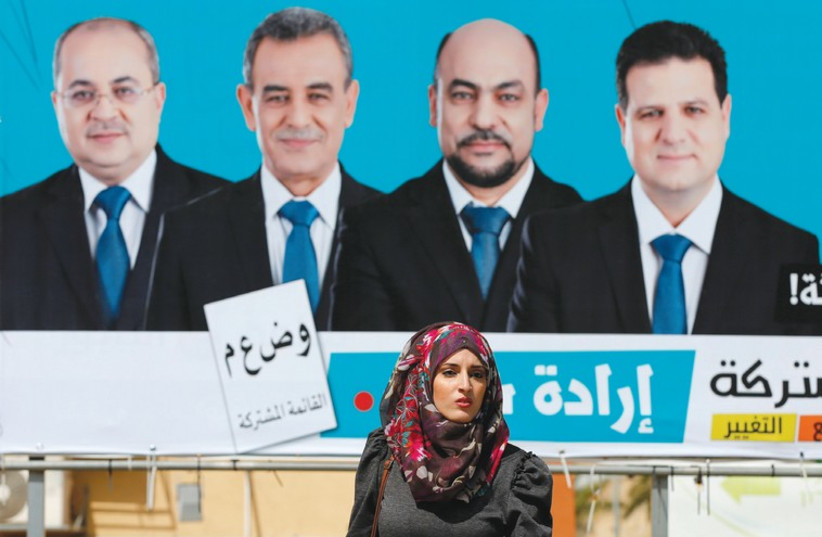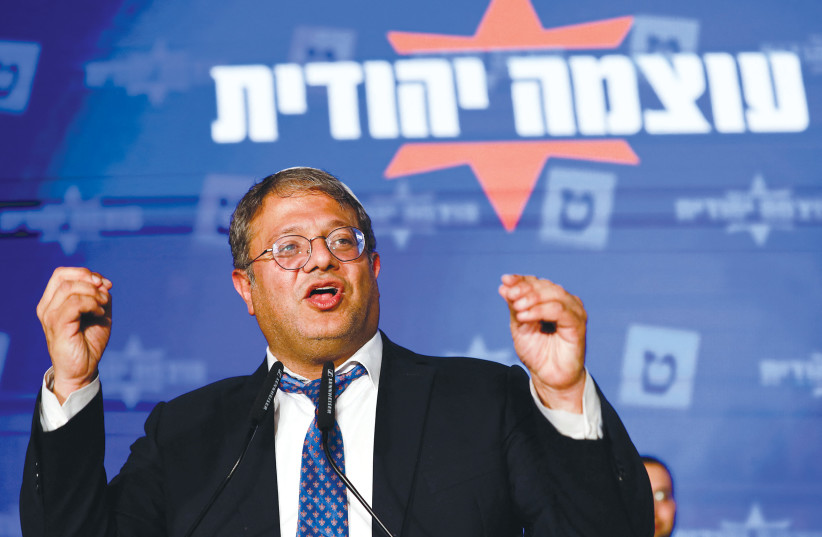The result of last week's election shows that there will soon be a coalition and government that is the most right-wing in Israel's history, including ultra-nationalists like MK Itamar Ben-Gvir and MK Bezalel Smotrich, who in the past have spoken harshly about Israel's Arab minority.
The Jerusalem Post spoke to two experts, Dr. Muhammed Khalaily of the Israel Democracy Institute and Mohammed Darawshe, Director of Strategy at the Givat Haviva Foundation, on the Israeli-Arab population in an attempt to understand the citizens' thoughts and feelings about the incoming coalition and government. Givat Haviva is the largest institution in Israel that works for shared Jewish-Arab society, and mostly runs educational programs focused on improving Arab integration into general Israeli society and on joint Jewish-Arab partnerships.
Both Khalaily and Darawshe began by stating that the first response amongst the Arab public to the election was frustration.
Arabs' frustrations come in four layers
The frustration had four layers, Darawshe said.
The first was that, despite the rise in Israeli-Arab voter turnout from below 45% in the March 2021 election to approximately 53% in this election, this was still far lower than the general rate of over 70%, and just Jewish voters was approximately 73%. "The Arab community is not maximizing its potential in political representation and [its ability to] play the full political game," Darawshe explained.

The second layer of frustration was that the increased turnout did not translate into political power. Both the Religious Zionist Party (RZP) and the combined Arab parties received approximately 500,000 votes, yet RZP won 14 seats and the Arab parties a combined 10 seats, Darawshe pointed out. This stemmed from disorganization and fragmentation of the Arab sector's politics, which created the split between Hadash-Ta'al and Balad and ended up wasting over 100,000 votes and contributing to the Right's ascent to power.
The third layer of frustration was that the Center-Left lost the election as well.
"This means that most of the ministers in the future government are going to be ranging from right-wing to far-right, and the policies of marginalization, discrimination and of downgrading the status of Arab citizens politically, either through legislation or through budgets, is going to go backward," Darawshe said.
He expressed concern that this would not only halt social and economic progress that was made during the outgoing government's tenure, but also bring about a "hurricane" of anti-Arab legislation similar to the Netanyahu government of 2015-2019, which ended in the Nation-State Law "which downgrades our status in Israel," Darawshe said.
The fourth layer of frustration was that the extreme-right wing was going to lead to anything from confrontations to possible war – either in mixed cities in Israel or between settlers and military confrontations with the Palestinians in the West Bank that will "once again be put into the uncomfortable position of choosing between our state and our people," Darawshe said.
Khalaily also said that the immediate response to the election was frustration, and echoed Darawshe in that there was frustration both from Arab politicians and Center-Left Jewish politicians. But even a unified Arab party may not have changed the outcome, as the election reflected deep currents in Jewish Israeli society, which is heading further and further to the right, Khalaily said.
The outcome for Israeli Arabs is "a mixture of uncertainty, apprehension and fear," Khalaily said.
'Israel's new Right is militant, nationalist and fundamentalist'
"These people are not classic right-wingers, they are a new Right that includes two elements: extreme militant nationalism and religious fundamentalism," Khalaily said.
This was going to "change the face of Israeli society," he warned and repeated Darawshe's concern for discriminatory legislation against the Arab public.
Even Ben-Gvir's use of the term 'sovereignty' is different than [left-wing Meretz leader] Zehava Galon's. He doesn't want sovereignty in the sense of enacting the law, what he wants is Jewish supremacy over the Arab public," Khalaily said. If he receives the Public Security Ministry he could place limitations on Arab development, and this is why the public fears "far-reaching legal and institutional changes," Khalaily added.
Both Dawarshe and Khalaily said that their fear was not just of discriminatory policy, it was also fear for their personal safety – and both mentioned the incident in when Ben Gvir pulled out his gun last month in Sheikh Jarrah and encouraged policemen to shoot people who had been throwing stones at him.
"There was a classic incident that begged attention before the election, where Ben-Gvir, an MK, not a random person … who is also going to serve in a ministerial position in the next government, pulled out a pistol because he felt threatened," Khalaily said.
Will Arab lives be under threat during Netanyahu's third reign?
The Arab public feared that this could lead to citizens being too quick to use live fire against them, and could lead to the clash between Arabs and Jews in mixed cities becoming commonplace, Khalaily said.

He also expressed concern that innocent Arab citizens would increasingly become collateral damage in the fight against crime in the Arab sector, since this could be used as an excuse to commit acts of vengeance and turn Arab towns into the country's "backyard."
"There is a real fear of a threat on the Arab public's doorstep," Khalaily said, adding that Ben-Gvir would turn Israeli democracy into a "tyranny of the majority" and "trample" the Arab public. "For him, the will of the people is the will of the majority, and he plans to go all the way with this," Khalaily said.
Darawshe expressed a similar sentiment. He added that he could not comprehend how the Jewish people, who suffered so much as a minority, would move towards a path of oppression of its own minority, which Darawshe called "a sick knee-jerk reaction."
Instead, he expected understanding and empathy, not just because of the Jewish people's history but also as a strategic interest of the Jewish people today: Israel should acknowledge the necessity of its Arab minority and see it as a bridge to peace with the rest of the Arab world and prove that Jewish-Arab partnership was possible, Darawshe argued.
"If you can't prove it works inside Israel, then forget about it working with the Emirates or…any other country in the middle east," Darawshe said.
"If you can't prove [peace] works inside Israel, then forget about it working with…any other country in the middle east"
Mohammed Darawshe, Director of Strategy at the Givat Haviva Foundation
It, therefore, was the Jewish people's strategic interest to try to "find the right formula" to coexist peacefully with its Arab minority – and even see Arab citizens as a gift, since it could show the world what coexistence looks like, Darawshe argued.
Darawshe mentioned that MKs from the Likud called from the Knesset podium in June for a second "nakba."
"This is sick racism bordering on fascism, and will hurt not just Arab citizens but also the concept of the Jewish homeland, which cannot tolerate other identities," Darawshe said.
20% of young Israelis 'willing to attack Arabs'
Dawarshe said that he feared it personally as well. 20% of Israel's younger voters chose Ben-Gvir, which indicates that "20% of the young generation are willing to engage in active attacks against Arab citizens, where the model is to pull out your gun and try to shoot the next Arab that makes you feel uncomfortable," he said.
"This is lunatic behavior that Ben-Gvir brought into the public sphere in Israel, and many people might translate that into action whenever there is some tension, which may not have been caused by Arab citizens." Arab citizens will be an easy scapegoat to diffuse the anger or frustration of Jewish right-wing extremists in Israel, "specifically when they are in power and can be protected," Darawshe said.
Ben-Gvir's plan to give immunity to soldiers and police officers, where they can fire at will without having to fear court, was "facism," Darawshe argued, since a characteristic of fascist regimes was "when regimes use their security forces for fascist racist actions without fearing punishment or legal questioning," Darawshe said.
As a parent of four children who operated within Jewish environments, including in mixed cities, Dawarshe said he was concerned for their personal safety.
"We are moving towards a culture of targeting Arab individuals as individuals in jewish public space as well as targeting Arab citizens as a collective through discriminatory policies."
The police, Dawarshe said, already blame Arabs when there is a conflict between Jew and Arab. The treatment was unfair to begin with, and now if officers want to please their superiors, their relationship with the Arab community will worsen, he added.
"The feeling is one of sitting ducks," Darawshe said.
Having said this, Darawshe said that there was reason for hope.
There is already evidence of conflicting views amongst the upcoming coalition and this could lead to the government eventually imploding, a not-uncommon event in Israel, Darawshe said. Even if it didn't, the fact of the matter is that there were only 30,000 more votes to the pro-Netanyahu bloc than the anti-Netanyahu bloc, and that this meant that there was room for hope that of the Center-Left and Arab voters organize themselves better, they may have a chance of winning the next election, Darawshe argued.
Another reason for hope was the "islands of success in Jewish-Arab relations," including integration of Arabs in the medical, hi-tech and finance industries, Darawshe said.
"I hope that these teams of Jews and Arabs will defend the success they had together, because this is not just a war on Arab society, it is a war on the nature of democratic shared society, which Jews also have a vested interest in," he concluded.
